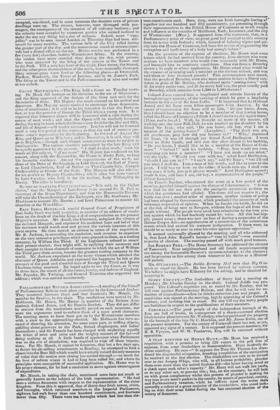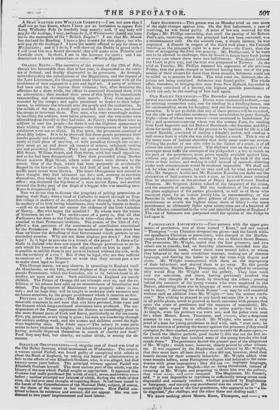PARLIAMENTARY REFORM ASSOCIATION.—A meeting of the friends of Parliamentary Reform
took place yesterday in the Crown and Anchor. They mustered between three and four hundred ; Mr. Monck, the member for Reading„ in the chair. The resolutions were moved by Mr. Hobhouse, Mr. Hume, Mr. Hector (a member of the Reform Asso- ciation), Colonel Jones, and Sir Francis Burdett. They did not differ in essence from the resolutions usually passed on such occasions, nor were the arguments used to enforce them of a more novel character. The meeting seems to have been got up by the Westminster members with a view to the approaching election. Mr. Hohhouse has been ac- cused of directing his attention, for some years past, to trifling objects, piddling about gateways to the Park, Strand shopkeepers, and ladies' shoemakers ; and Sir Francis has been charged with neglecting equally his tithes of mint and anise and the weighty matters of the law—of doing nothing at all. A little bustle of appearance when Parliament was on the eve of dissolution, was required to wipe off these imputa- tions. For Mr. Monck, it cannot be forgotten, that but a few days ago, to flatter his ale-selling constituents at Reading, he attempted to foist a clause into the Beer Bill which would have utterly ruined the only measure of value that the session now closing has carried through ;—so much for his love of reform where it had so long been called for, and where its principles were susceptible of successful application. Mr. Hume was in his proper element, for he had a resolution to move against extravagance of expenditure.
Mr. Monck, in taking the chair, mentioned some facts not much or generally known on the subject of the Irish representation. " He had seen a curious document with respect to the representation of the sister kingdom. From this it appeared, that of thirty-four Irish towns, cities, and boroughs, which returned members to the Imperial Parliament, eighteen had each fewer than. one hundred constituents, and fourteen fewer than fifty. There were ten. boroughs which had less than six- teen constituents each. Here, then, were ten Irish boroughs having al. together not one hundred and fifty constituents, yet possessing through their representatives in the British House of Commons as much weight and influence as the counties of Middlesex, York, Lancaster, and the city of Westminster. (Hear.) It appeared from this statement, that, in a Parliamentary point of view, no great good had resulted to this country from its union with Ireland ; which, instead of infusing vigour and pu- rity into the House of Commons, had been the means of augmenting the corruption and inefficiency of a body bad enough before."
On the question of the expense of elections, Mr. Hume read some letters which he had received from the country, from electors who were anxious to have members 'who would vote constantly with Mr. Hume, and besought him to nominate candidates. One was from a Beverley elector ; in reply to whose application, Mr. Hume asked what would be the expense of returning such a member as the electors wished, and was told three or four thousand 'pounds ! This correspondent next stated, that the people of Beverley were also most anxious to have a liberal can- didate in place of Mr. Batley, who declined again " coming down " with 4/. for every entire vote, and 21. for every half one, the price usually paid at Beverley, which contains from 1,300 to 1,400 electors !
Colonel Jones entered into a lengthened and minute history of the borough-monger system ; of the working of which he gave a laughable instance in the case of Sir Isaac Coffin. " It happened that he (Colonel Jones) and Sir Isaac were fellow.passengers from America. In the course of conversation Sir Isaac said to him, Do you know, Jones, that I should have no objection to be a member of that jawing house, celled the House of Commons ; I think I should make no shy figure there.' (Hear, and a laugh.) Well, he thought no more of the matter, till walking one day near Pall-Mall, he was touched on the shoulder by his friend °Sir Isaac, who said, Do you know, old boy, that I am a member of the jawing-house ?' (Laughter.) The devil you are, old gentleman, pray how did you become so?' ' Why,' explained Sir Isaac, it was all through my friend Lord Darlington. I went down to Raby Castle, and said one day after dinner to his lordship, " Do you know, I should like to be a member of the House of Com- mons." " Indeed ! " said his lordship. "Pray, how would you vote, supposing you were a member ?" "I have not made up my mind," was the reply. "Would you vote with me," asked Lord Darlington, "should I put you in " "I can't say," said Sir Isaac ; " but I'll tell you what I shall do. I am a man of few words, and like to come to the point. I will toss up here on the table : if heads turn up, I shall vote with you ; if tails, just as it pleases myself." Lord Darlington agreed: heads it was, and here I am, old boy, a representative of the people.'" (Great Laughter.)
Sir Francis Burdett, who entered the room at a late period of the meeting, justified himself against the charge of lukewarmmss. " It was true that he did not then give the energetic expression to them to which the gentleman had alluded. The times did not require it ; the battle was over ; another order of measures, another system of policy had been adopted by Government, which precluded the necessity of such vehement expression of opinion. When he fought the battle, he did so at the risk of being sent to Newgate, without the hope of aid from the people without. The people were awed into submission by the iron sys. tern against which he bad fearlessly raised his voice. All this had hap. pile passed away ; there was now no fear of having a suspension of the Habeas Corpus Act—no apprehension of a recurrence of the calamitous events which had excited his warmest indignation. If there were, he should be as ready as ever to raise his voice against oppression."
It seemed universally allowed by the meeting and all who addressed it, that Lord John Russell's horror—" vote by ballot"—was essential to purity of election. The meeting passed off with much good humour.
SIR ROBERT PEEL.—The Home Secretary has addressed the electors of Tamworth. Near neighbourhood and old family acqUaintanceship are among the honourable Baronet's recommendations to the electors ; and he promises to live among them whenever his duties as a Minister will permit.
Mu. O'CoNNELL.—The Dublin Evening Mail says that Big 0 in- tends to stand for Meath. He has been invited by various counties. We believe he might have Kilkenny for the asking, and be thanked for accepting it.
SURRY COUNTY.—The freeholders of Sorry had a meeting on Monday; Mr. Charles Barclay in the chair. Colonel Joliffe was pro- posed. The Colonel's requisites are, as stated by Mr. Barclay, that he will vote against Parliamentary Reform, and that he will vote for re- duction of expenditure—when he thinks reduction just and proper. A requisition was signed at the meeting, highly approving of the Colonel's conduct, and inviting him to stand. No one will say the Surry people are fastidious in respect to the qualifications of their members. CORNWALL.—The good people of the independent boroughs of St. Ives are full of bustle, in consequence of a sharp-contested election likely to take place between Mr. Virellesley, who has purchased the property in the borough of the late Sir C. Hawkins, and Mr. James Heise, one of the present members. For the county of Cornwall there has not, as yet, appeared any signs of a contest. It is supposed the present members, Sir R. R. Vyvyan, and W. W. Pendarves, Esq. will be returned without opposition. A SEAT REFUSED BY HENRY HUNT.—Mr. Hunt has received a requisition, with a promise to bring 178 voters to the poll free of expense, from some freeholders in Somersetshire. Hunt modestly de- clines standing. He says-5" It appears the Tory Sir Thomas has aban- doned his disgraceful occupation, dreading a repetition of the castigation he received at the last election. The freeholders are now to be turned over to two hungry H,ligs, who will, in all human probability, plunder them even more than the united factions did—the latter having acted as a check upon each other's rapacity." Mr. Hunt will not walk ten yards, or do any other act, to prevent this ; bat, on the contrary, he will look on with great complacency whilst this process of plunder is making its way into every man's pocket in the county, by means of parochial, county,
and Parliamentary taxation, while he reflects upon the worse than
looker
cowardly cmduct of a great majority of the freeholders, who stood
frig on with their arms folded-during the last contested election of the
'county of Somerset. •
A SEAT WANTED FOR WILLIAM COBBETT.-.4 am not sure that I shall not go into Essex, where I have got an invitation to oppose Pole Long 'Wellesley Pole (a fearfully long name); and, if any body will pay for the hustings, I may, perhaps do it, if Westminster shebld not keep me in the metropolis ofthe " British Empire." I see that Mr. Monck has declined for Reading. I have a Witt to start for that place ; but who will pay for the hustings 9 I have she money offered to pay for them at Westminster; and if I do it, I will show.up the Daddy in grand style I I will treat him to a Scotch document, that will make even Thimble and Cowhide stare. In short, I am in the humour for sport ; and I am determined to have it somewhere or other.— Weekly Register.



























 Previous page
Previous page